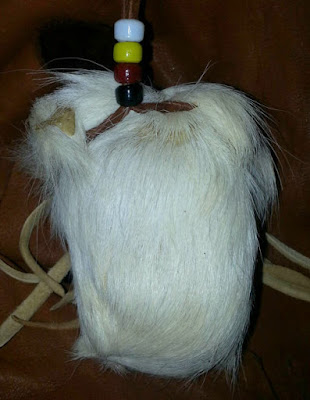 |
| A Native American medicine bag made of deer scrotum, just to give a better idea of what a deer scrotum quiver might look like. (Source: Etsy) |
Mao Hu Lu Bing was originally a militia force that first rose to prominence during late Yuan period as they fought the peasant rebels that eventually overthrew Yuan Dynasty. During Ming period, they consisted of illicit silver miners, salt peddlers, bandits and other violent outlaws.
Equipment
Like their namesake, Mao Hu Lu Bing made extensive use of crossbow. They were also good spearmen, and used Chang Qiang (長鎗) just as much as their crossbows. Mao Hu Lu Bing were known to occasionally dual-wield in battle, using an axe in one hand and a two-pronged fork in another.Mao Hu Lu Bing wore leg guards made of bamboo slips, but did not use other protective equipment.
Organisation and tactics
As Mao Hu Lu Bing were essentially outlaws when not employed by Ming court, they probably did not have a fixed organisational structure. Generally speaking, Mau Hu Lu Bing operated in bands of several hundreds to several thousands and led by their leaders known as Jiao Nao (角腦). As Mao Hu Lu Bing lived in the mountains, they probably employed similar tactics as other hill people of China, and fought in mutually supportive spearman-crossbowman teams.Service records
Mao Hu Lu Bing had the reputation of being fierce and violent, which made them a valuable addition to the Ming army. They participated in almost every battle that Ming army had fought, including campaign against Wokou (倭寇), Mongol incursions, Manchu conquest, suppressing of White Lotus rebellion, Yang Ying Long (楊應龍) rebellion, She An Lolo rebellion (奢安之亂), late Ming peasant rebellions, and the struggle against Jurchens/Manchu. During late Ming period, some Mao Hu Lu Bing joined the Great Shun and fought against those still loyal to the Ming.Like many Ming auxiliary troops such as Tu Bing (土兵) and Bai Gan Bing (白桿兵), Mao Hu Lu Bing were also expert mountaineers. However, they were ill-equipped to fight at the dry plains of North China and treacherous wetlands of South China. Mao Hu Lu Bing's aggressiveness made them frequently fall victim to Wokou ambushes, while their lack of armour rendered them unable to withstand the ferocity of heavily armoured Jurchen warriors.
Reference:
明代的毛葫蘆兵 on 逸佚居 (Traditional Chinese).
why ming dynasty have so many unofficial army?
ReplyDeletechina and many near country take extremely centuralize goverment system Ming china is not a exception
Because "soldier" during Ming period is not a profession that one can enlist/de-enlist on a whim,but more like a hereditary caste. If you are born into a soldier household, you are in it for life.
DeleteIf people from other class/caste were recruited into military, they became “citizen soldier” instead, these people were not necessarily “unofficial” (although many were), but fall under different military system.